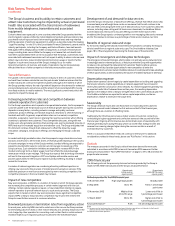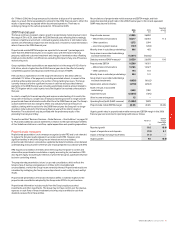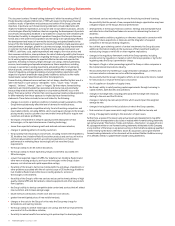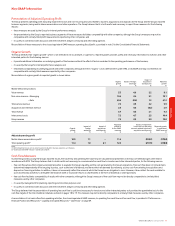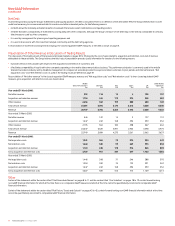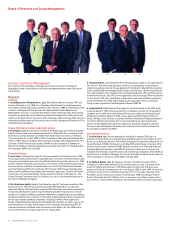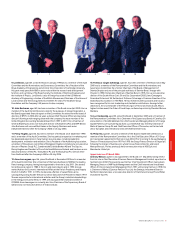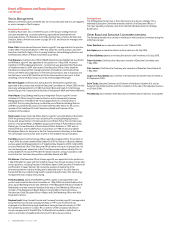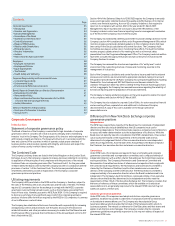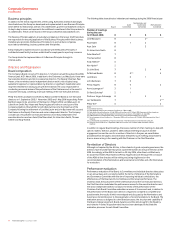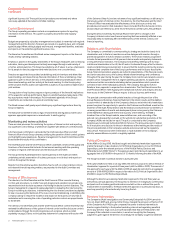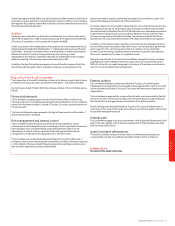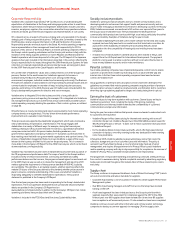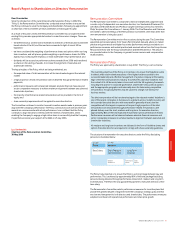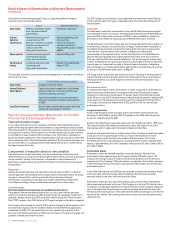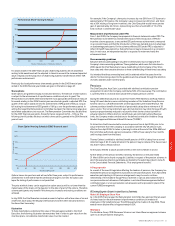Vodafone 2006 Annual Report Download - page 56
Download and view the complete annual report
Please find page 56 of the 2006 Vodafone annual report below. You can navigate through the pages in the report by either clicking on the pages listed below, or by using the keyword search tool below to find specific information within the annual report.
54 Vodafone Group Plc Annual Report 2006
Corporate Governance
continued
Business principles
In addition to the formal requirements of the Listing Authorities and Stock Exchanges
described above, the Group has developed and implemented its own Business Principles
which define its relationships with all of its stakeholders, govern how Vodafone conducts
its day-to-day business and represents the additional commitments the Group makes to
its stakeholders. These can be found on the Group’s website at www.vodafone.com.
The Business Principles apply to all subsidiary companies in the Group. Chief Executives
are responsible for ensuring application of the Business Principles within their business.
Vodafone also promotes the Business Principles to its joint venture companies,
associated undertakings, business partners and third parties.
Every employee is expected to act in accordance with the Business Principles. A
confidential email facility has been established for employees to report any concerns.
The Group tracks the implementation of its Business Principles through its
internal audits.
Directors and Organisation
Board composition
The Company’s Board consists of 16 directors, 12 of whom served throughout the 2006
financial year. At 31 March 2006, in addition to the Chairman, Lord MacLaurin, there were
four executive directors and ten non-executive directors. The Deputy Chairman, Paul
Hazen, is the nominated senior independent director and his role includes being
available for approach or representation by directors or significant shareholders who
may feel inhibited from raising issues with the Chairman. He is also responsible for
conducting an annual review of the performance of the Chairman and, in the event it
should be necessary, convening an annual meeting of the non-executive directors.
Philip Yea, Anne Lauvergeon and Anthony Watson joined the Board as non-executive
directors on 1 September 2005, 1 November 2005 and 1 May 2006 respectively. Peter
Bamford ceased to be a member of the Board on 7 March 2006. Lord MacLaurin, Sir
Julian Horn-Smith, Paul Hazen and Penny Hughes will retire on conclusion of the
Company’s AGM on 25 July 2006. Sir John Bond will become the Chairman of the
Company following the retirement of Lord MacLaurin and John Buchanan will succeed
Paul Hazen as the Deputy Chairman and senior independent director. The Company
considers all of its present non-executive directors to be fully independent. The
executive directors are Arun Sarin (Chief Executive), Sir Julian Horn-Smith, Thomas
Geitner and Andy Halford.
The following table shows directors’ attendance at meetings during the 2006 financial year:
Nominations and
Audit Governance Remuneration
Board Committee Committee Committee
Number of meetings
during the year
to 31 March 2006 8 5 3 5
Lord MacLaurin 8 2(1)
Paul Hazen 8 1 2
Arun Sarin 8 3
Sir Julian Horn-Smith 8
Peter Bamford(2) 7
Thomas Geitner 8
Andy Halford(3) 6
Ken Hydon(4) 2
Sir John Bond 7 2 4
Dr Michael Boskin 8 5(1)(5) 5
Lord Broers 7 5 1
John Buchanan 7 5
Penny Hughes 8 4 2
Anne Lauvergeon(6) 31
Sir David Scholey(4) 21
Professor Jürgen Schrempp 8 2 5
Luc Vandevelde 7 4(1)(7)
Philip Yea(8) 62
Notes:
(1) Committee Chairman.
(2) Peter Bamford ceased to be a member of the Board on 7 March 2006.
(3) Andy Halford joined the Board on 26 July 2005 and from then until 31 March 2006 there were six Board meetings.
(4) Ken Hydon and Sir David Scholey retired from the Board on conclusion of the AGM on 26 July 2005.
(5) Dr Michael Boskin succeeded Paul Hazen as Chairman of the Audit Committee during the year.
(6) Anne Lauvergeon joined the Board on 1 November 2005 and from then until 31 March 2006 there were four Board
meetings.
(7) Luc Vandevelde succeeded Penny Hughes as Chairman of the Remuneration Committee during the year.
(8) Philip Yea joined the Board on 1 September 2005 and from then until 31 March 2006 there were six Board
meetings.
In addition to regular Board meetings, there are a number of other meetings to deal with
specific matters. Directors unable to attend a Board meeting because of another
engagement, as was the case for a number of directors in the year, are nevertheless
provided with all the papers and information relevant for such meeting and are able to
discuss issues arising in the meeting with the Chairman or the Chief Executive.
Re-election of Directors
Although not required by the Articles, in the interests of good corporate governance, the
directors have resolved that they will all submit themselves for annual re-election at the
AGM. Accordingly, at the AGM to be held on 25 July 2006, other than Lord MacLaurin,
Sir Julian Horn-Smith, Paul Hazen and Penny Hughes who are retiring at the conclusion
of the AGM, all the directors will be retiring and, being eligible and on the
recommendation of the Nominations and Governance Committee, will offer themselves
for re-election.
Performance evaluation
Performance evaluation of the Board, its Committees and individual directors takes place
on an annual basis and is conducted within the terms of reference of the Nominations
and Governance Committee with the aim of improving individual contributions, the
effectiveness of the Board and its Committees and the Group’s performance. The
Chairman leads the assessment of the Chief Executive and the non-executive directors,
the Chief Executive undertakes the performance reviews for the executive directors and
the senior independent director conducts the review of the performance of the
Chairman. Each Board Committee undertakes a review of its own work and, in relation to
the performance of the Board, each director is required to complete a comprehensive
questionnaire, the results of which are analysed and discussed by the Nominations and
Governance Committee prior to the presentation of recommendations to the Board. The
evaluation process is designed to cover Board processes, the structure and capability of
the Board, strategic alignment, Board dynamics and the skills brought to the Board by
each director. A series of questionnaires has also been developed to facilitate the
evaluation processes for each Board Committee.


